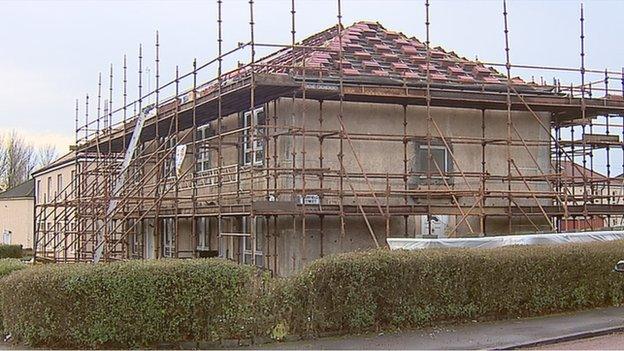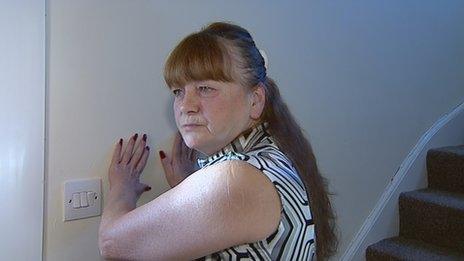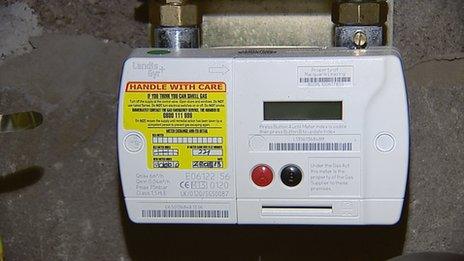Heat is on: Improving energy efficiency of Scottish homes
- Published

GHA says its spent £1.2bn on improving thousands of homes like Joyce King's
Improving the energy efficiency of Scottish homes is helping some escape from fuel poverty, but as energy prices rise, the challenges grow.
Joyce King has had a good winter. Her home, in the east end of Glasgow, is now warm and comfortable, and that's very different from what she's used to.
For years her upstairs bedrooms were too cold to sleep in during winter months. Now, there's no reason for her to stay on the ground floor.
"Its great to be able to live the way you should be living, instead of coming up here, chittering. You could see your breath when you came up here," she said.
Joyce's two-bedroom home in Carntyne was constructed after the war, during a boom in council house building. Its design was basic, and the house was cold and draughty in the winter. She points to the foot of the staircase.
"This is where I used to put the curtain up, every winter, just to save the draught that was coming down the stairs. I used to put a curtain up, full length, to keep the heat down here, because it was absolutely frozen. I practically moved downstairs, and slept on the settee.
"But what a difference now. The whole house is the same temperature to walk about. It's absolutely brilliant."
Snug and comfortable
Last year, Joyce King's landlord, Glasgow Housing Association (GHA) gave her home a complete makeover: new insulation to its attic, walls and floors, new roof tiles, over-cladding for the exterior, and a new and efficient central heating system.

Joyce said she had to put a curtain up in the winter to stop the draught from upstairs in her home
The effect has been dramatic, not least on her heating costs. Last winter, Joyce would spend up to £7 a day, trying and failing to keep her house warm. Now she needs to put the heating on for just two hours a day, to keep her home snug and comfortable. She says her fuel bill has fallen sharply.
GHA took control of Glasgow's 40,000 council houses in 2003. Since then it says its spent £1.2bn on improving thousands of homes like Joyce King's, to deal with the legacy of poor housing, and decades of under-funding.
Its efforts to improve the energy efficiency of Scottish homes coincided with sharp rises in fuel bills across the UK, as energy prices rose year-on-year. That's something that executive director Alec McGuire, who's in charge of the repair and maintenance programmes is well aware of.
"One of the challenges is to make the properties as energy-efficient as possible," he said.
"At the same time as that £1.2bn of investment, the frustrating thing is energy prices went up by 150%. So think about the impact that could have had, if energy prices had been much flatter than that.
"However I think it makes it even more worthwhile, when energy prices are increasing year on year, this will stand the test of time going forward, and the tenants will have a fighting chance of keeping their home warm and dry, and will be able to afford those bills."
Across Scotland, many householders are following suit, in a bid to reduce their energy bills.

Many householders are looking at ways to improve the energy efficiency of their homes
About 90,000 homes have had new loft and cavity wall insulation in the last two years, funded by local authorities, and by the Scottish and UK governments. This improved insulation should help cut many fuel bills, and reduce CO2 emissions.
Between 2011 and 2012, the proportion of houses rated "good" on the national scale for energy efficiency rose.
But as fuel bills rise, challenges remain. According to a study released by the charity Turn2us, households in the UK are facing a growing gap between the energy bills they need to pay and what they can afford.
The charity warns that rising energy costs are having a severe impact on people's lives.
Switching suppliers
Despite those rising fuel bills, it seems fewer customers are switching energy supplier than in the past.
According to UK government statistics, the number of households moving from one energy firm to another has fallen steadily since 2008.
Trisha McAuley, director for Scotland at Consumer Futures says a a lack access to the internet and banking services holds back those who really need to switch.
"We think there is still a point in switching," she said.
"However research tells us that consumers aren't seeing much difference between suppliers, and that's putting them off from switching. Less and less of us are doing it. But we live in really bad economic times, and there is money and savings to be had.
"Its just knowing how to go about it. What we find is the people who switch least are the people who are really fuel poor, and who could make the greatest benefits from saving by switching supplier, but its very hard for them to know where to turn and how to do it properly."
With fuel bills likely to rise in the years ahead, households may face a growing challenge, as they try to keep the lights and heating on, at a price they can afford. And governments' efforts to reduce fuel poverty are likely to specially target those most in need of help.